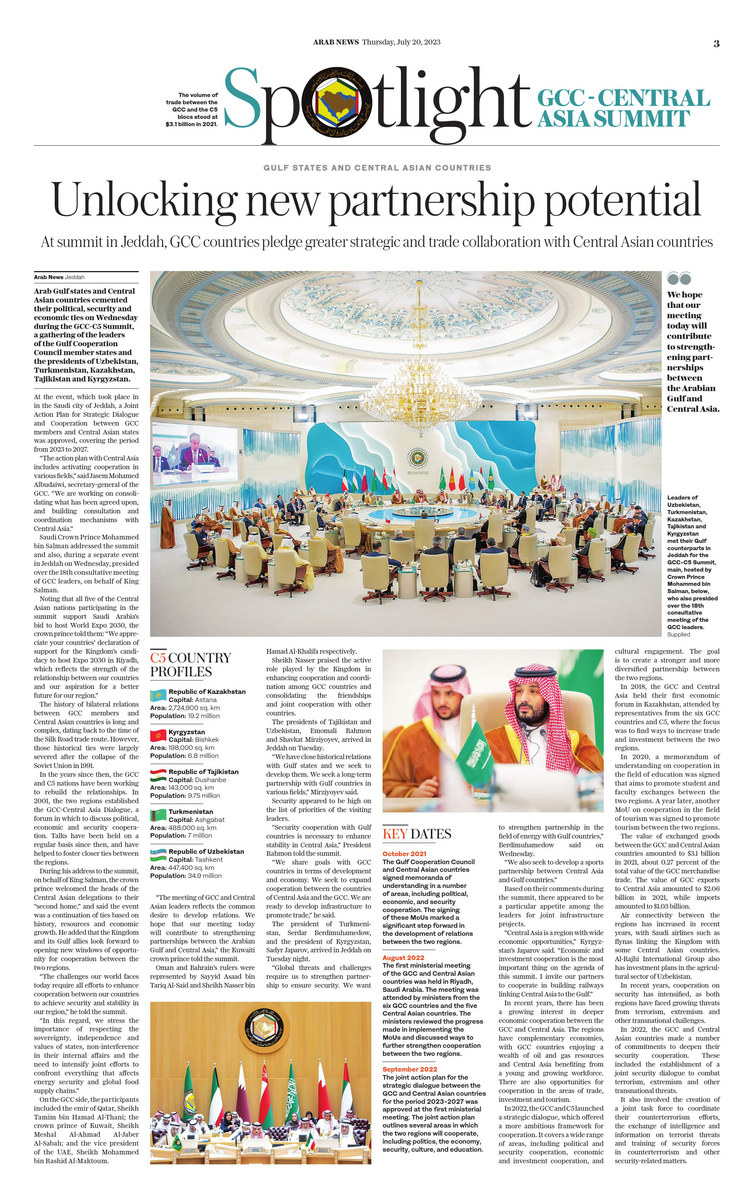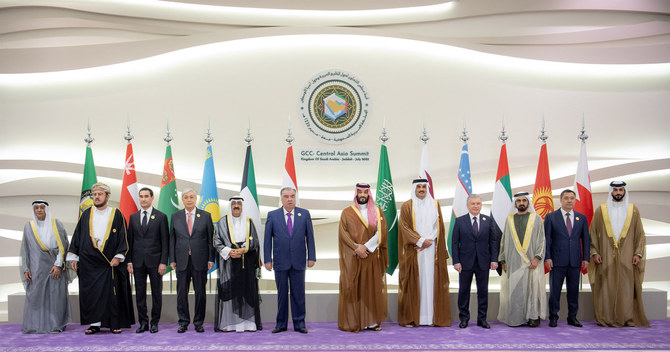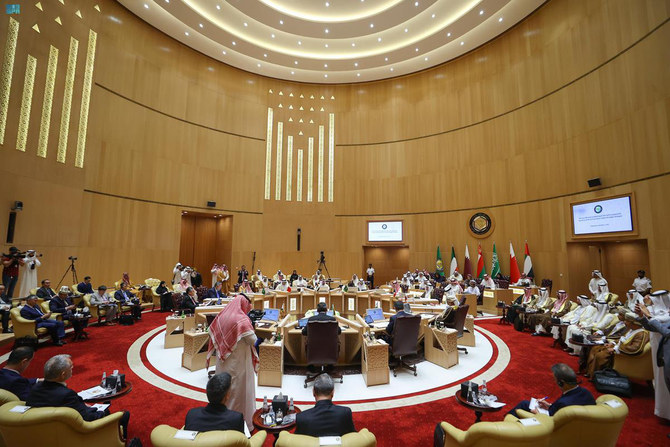JEDDAH: Arab Gulf states and Central Asian countries cemented their political, security and economic ties on Wednesday during the GCC-C5 Summit, a gathering of the leaders of the Gulf Cooperation Council member states and the presidents of Uzbekistan, Turkmenistan, Kazakhstan, Tajikistan and Kyrgyzstan.
At the event, which took place in in the Saudi city of Jeddah, a Joint Action Plan for Strategic Dialogue and Cooperation between GCC members and Central Asian states was approved, covering the period from 2023 to 2027.
In a joint statement at the end of the summit, the leaders of the two blocs stressed the importance of strengthening political and strategic relations at the collective and bilateral levels, and continuing coordination in order to achieve regional and international security and stability, confront challenges and work to ensure flexibility” in fields ranging from supply chains to food security.

Leaders of Uzbekistan, Turkmenistan, Kazakhstan, Tajikistan and Kyrgyzstan met their Gulf counterparts in Jeddah for the GCC-C5 Summit, main, hosted by Crown Prince Mohammed bin Salman, who also presided over the 18th consultative meeting of the GCC leaders. (SPA)
Among other issues, they expressed concern about the growing rhetoric of racism and Islamophobia, and acts of violence against Muslim minorities and Islamic symbols.
“The action plan with Central Asia includes activating cooperation in various fields,” said Jasem Mohamed Albudaiwi, secretary-general of the GCC. “We are working on consolidating what has been agreed upon, and building consultation and coordination mechanisms with Central Asia.”
In recent years, there has been a growing interest in deeper economic cooperation between the GCC and Central Asia. The regions have complementary economies, with GCC countries enjoying a wealth of oil and gas resources and Central Asia benefiting from a young and growing workforce. There are also opportunities for cooperation in the areas of trade, investment and tourism.
KEYDATES
October 2021 The Gulf Cooperation Council and Central Asian countries signed memoranda of understanding in a number of areas, including political, economic, and security cooperation. The signing of these MoUs marked a significant step forward in the development of relations between the two regions.
August 2022 The first ministerial meeting of the GCC and Central Asian countries was held in Riyadh, Saudi Arabia. The meeting was attended by ministers from the six GCC countries and the five Central Asian countries. The ministers reviewed the progress made in implementing the MoUs and discussed ways to further strengthen cooperation between the two regions.
September 2022 The joint action plan for the strategic dialogue between the GCC and Central Asian countries for the period 2023-2027 was approved at the first ministerial meeting. The joint action plan outlines several areas in which the two regions will cooperate, including politics, the economy, security, culture, and education.
Speaking on the sidelines of the Jeddah summit, Khalid Al-Falih, the Saudi minister for investment, said the Kingdom maintains close ties with nations in the Central Asian region and hopes to strengthen them further.
Saudi Crown Prince Mohammed bin Salman addressed the summit and also, during a separate event in Jeddah on Wednesday, presided over the 18th consultative meeting of Supreme Council of the GCC on behalf of King Salman.
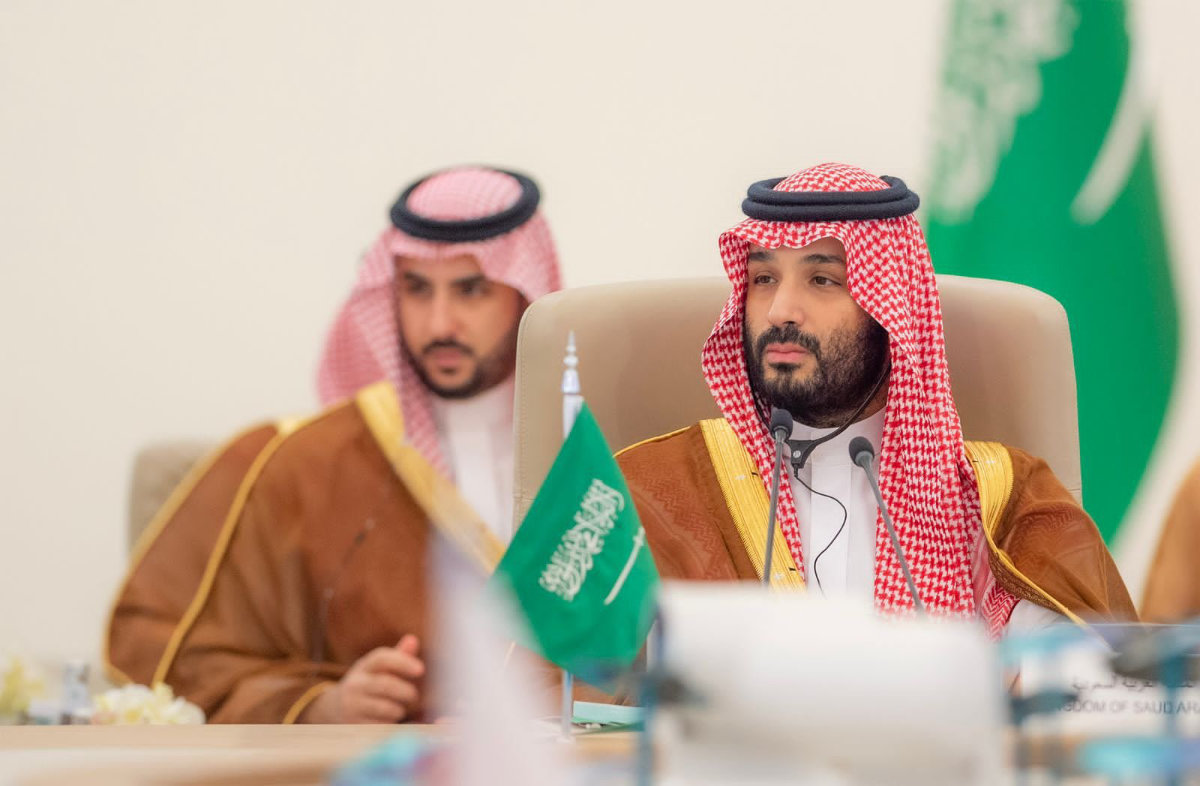
Saudi Arabia's Crown Prince Mohammed bin Salman presiding over the GCC-C5 Summit in Jeddah on July 19, 2023. (SPA)
Noting that all five of the Central Asian nations participating in the summit support Saudi Arabia’s bid to host World Expo 2030, the crown prince told them: “We appreciate your countries’ declaration of support for the Kingdom’s candidacy to host Expo 2030 in Riyadh, which reflects the strength of the relationship between our countries and our aspiration for a better future for our region.”
A press statement issued at the end of the consultative meeting quoted GCC Secretary-General Albudaiwi as saying: “Their Majesties and Highnessees reviewed during their meeting the developments of the joint GCC action process in addition to exchanging views on a number of regional and international issues.”
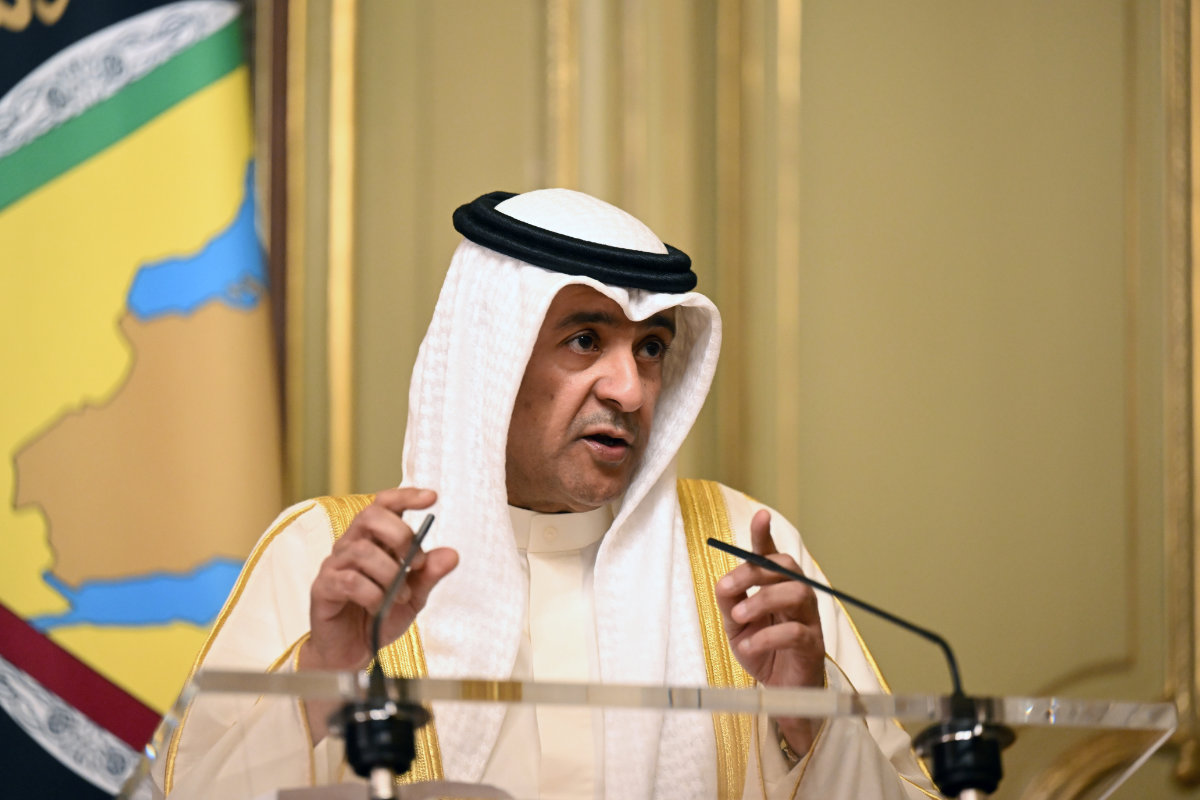
GCC Secretary-General Jasem Mohamed AlBudaiwi. (AFP/File photo)
Al-Falih said the reason the Kingdom decided to host this first-ever summit between GCC and Central Asian nations was to reinforce those existing ties, the Saudi Press Agency reported.
He said said the Kingdom’s proactive involvement with Central Asia, under the leadership of King Salman and the crown prince, had been well received at the regional, pan-Asian and global levels.
In his comments to the SPA about the summit, Al-Falih expressed optimism about the expected outcomes of the event, especially those related to the development and expansion of economic and investment relations between participating countries.
The history of bilateral relations between GCC members and Central Asian countries is long and complex, dating back to the time of the Silk Road trade route. However, those historical ties were largely severed after the collapse of the Soviet Union in 1991.
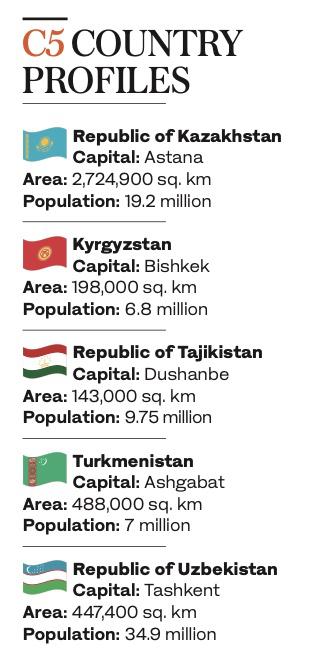 In the years since then, the GCC and C5 nations have been working to rebuild the relationships. In 2001, the two regions established the GCC-Central Asia Dialogue, a forum in which to discuss political, economic and security cooperation. Talks have been held on a regular basis since then, and have helped to foster closer ties between the regions.
In the years since then, the GCC and C5 nations have been working to rebuild the relationships. In 2001, the two regions established the GCC-Central Asia Dialogue, a forum in which to discuss political, economic and security cooperation. Talks have been held on a regular basis since then, and have helped to foster closer ties between the regions.
During his address to the summit, on behalf of King Salman, the crown prince welcomed the heads of the Central Asian delegations to their “second home,” and said the event was a continuation of ties based on history, resources and economic growth. He added that the Kingdom and its Gulf allies look forward to opening new windows of opportunity for cooperation between the two regions.
“The challenges our world faces today require all efforts to enhance cooperation between our countries to achieve security and stability in our region,” he told the summit.
“In this regard, we stress the importance of respecting the sovereignty, independence and values of states, non-interference in their internal affairs and the need to intensify joint efforts to confront everything that affects energy security and global food supply chains.”
On the GCC side, the participants included the emir of Qatar, Sheikh Tamim bin Hamad Al-Thani; the crown prince of Kuwait, Sheikh Meshal Al-Ahmad Al-Jaber Al-Sabah; and the vice president of the UAE, Sheikh Mohammed bin Rashid Al-Maktoum.
“The meeting of GCC and Central Asian leaders reflects the common desire to develop relations. We hope that our meeting today will contribute to strengthening partnerships between the Arabian Gulf and Central Asia,” the Kuwaiti crown prince told the summit.
Oman and Bahrain’s rulers were represented by Sayyid Asaad bin Tariq Al-Said and Sheikh Nasser bin Hamad Al-Khalifa respectively.
Sheikh Nasser praised the active role played by the Kingdom in enhancing cooperation and coordination among GCC countries and consolidating the friendships and joint cooperation with other countries.
The presidents of Tajikistan and Uzbekistan, Emomali Rahmon and Shavkat Mirziyoyev, arrived in Jeddah on Tuesday.
“We have close historical relations with Gulf states and we seek to develop them. We seek a long-term partnership with Gulf countries in various fields,” Mirziyoyev said.
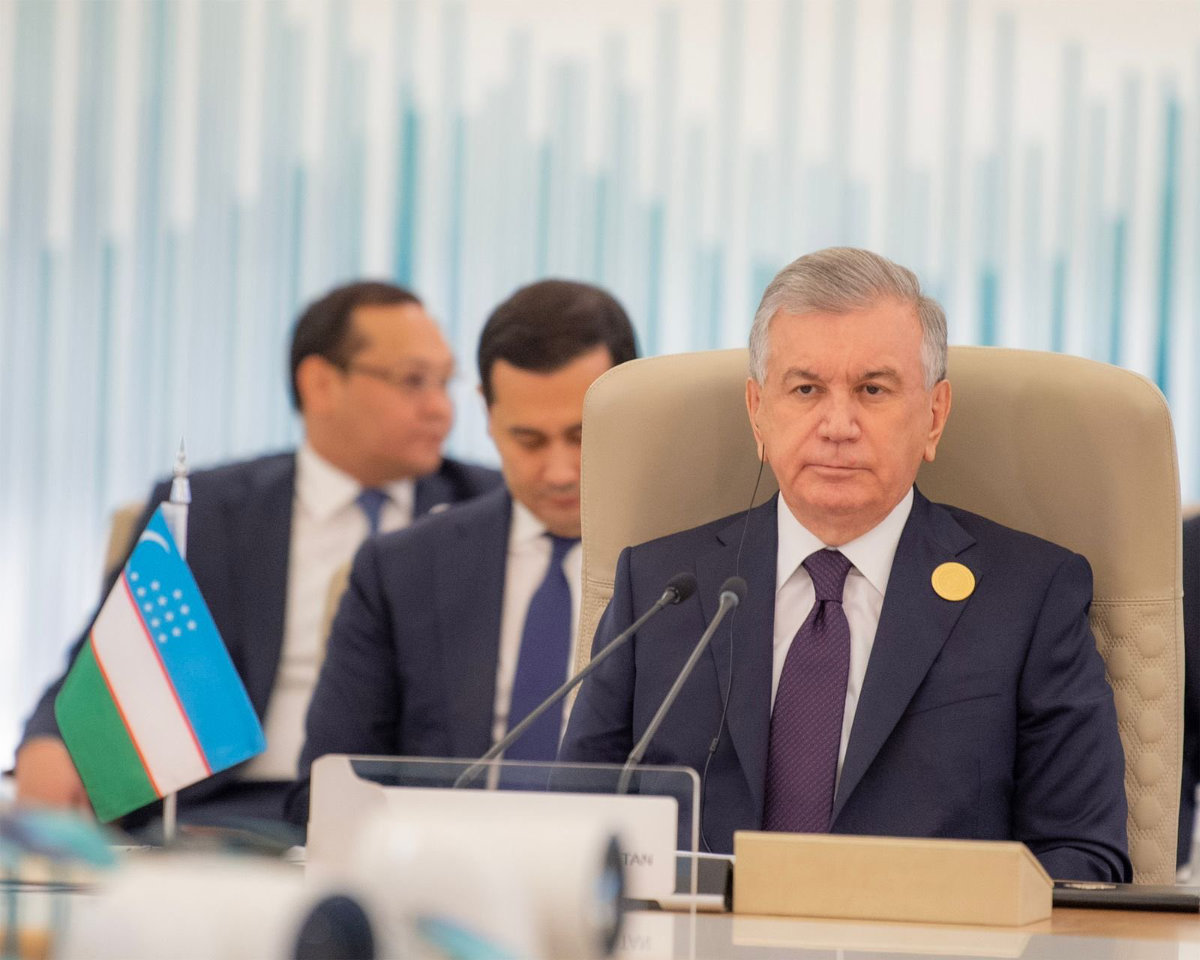
Uzbekistan's President Shavkat Mirziyoyev. (SPA)
“We look forward to economic and AI (artificial intelligence) cooperation with the Gulf. We seek to develop the clean-energy sector together with the Gulf. We are ready to implement a mechanism to enhance cooperation in the field of food security with the GCC.”
Security appeared to be high on the list of priorities of the visiting leaders.
“Security cooperation with Gulf countries is necessary to enhance stability in Central Asia,” President Rahmon told the summit.
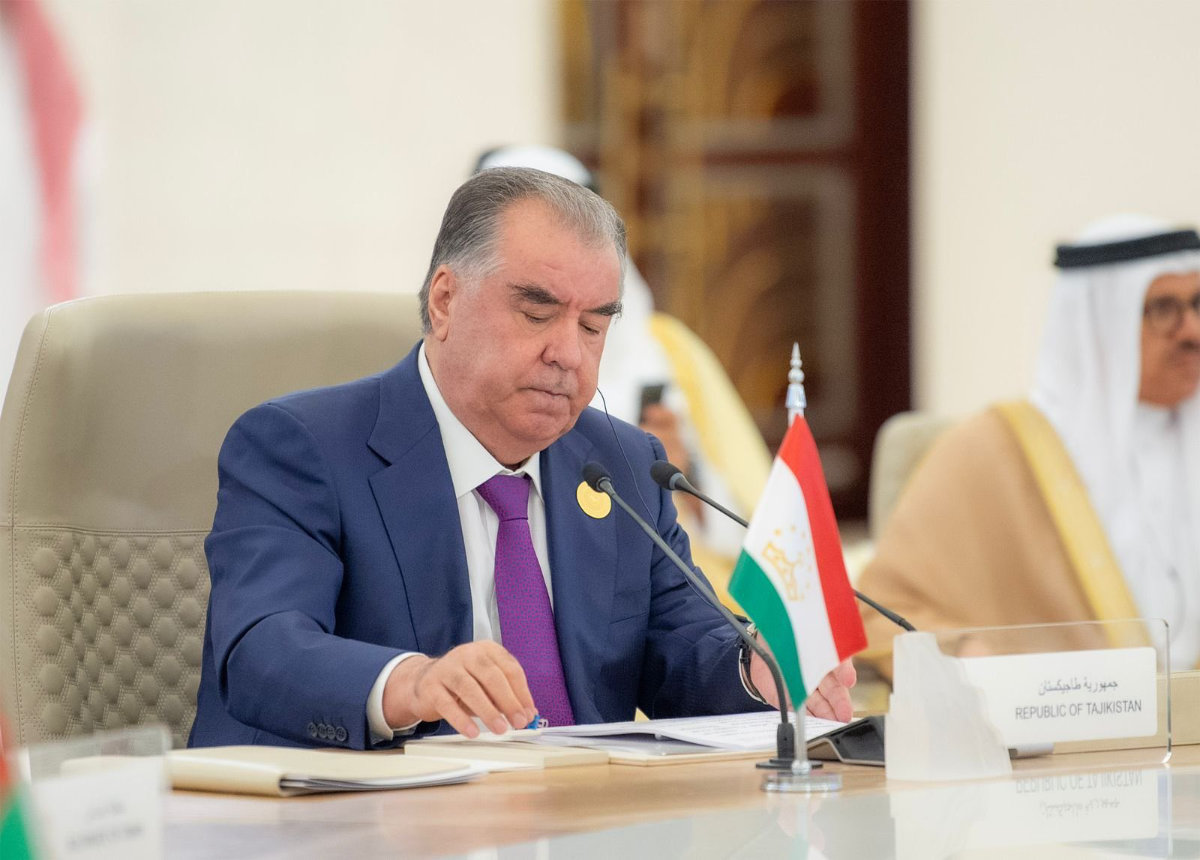
Tajikistan President Emomali Rahmon. (SPA)
During his visit, Kassym-Jomart Tokayev, the president of Kazakhstan, visited Madinah, where he prayed in the Prophet’s Mosque ahead of the summit.
“We share goals with GCC countries in terms of development and economy. We seek to expand cooperation between the countries of Central Asia and the GCC. We are ready to develop infrastructure to promote trade,” he said.
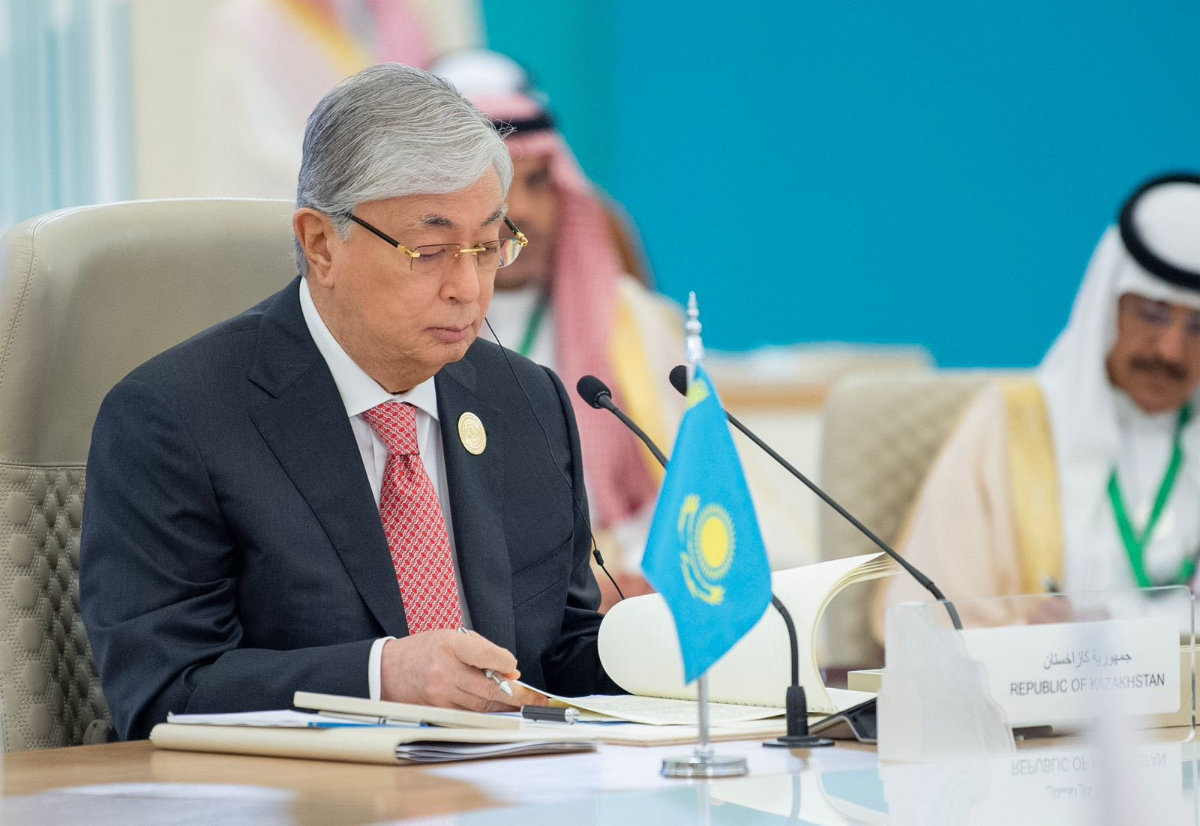
Kazakhstan President Kassym-Jomart Tokayev. (SPA)
The president of Turkmenistan, Serdar Berdimuhamedow, and the president of Kyrgyzstan, Sadyr Japarov, arrived in Jeddah on Tuesday night.
“Global threats and challenges require us to strengthen partnership to ensure security. We want to strengthen partnership in the field of energy with Gulf countries,” Berdimuhamedow told the summit on Wednesday.
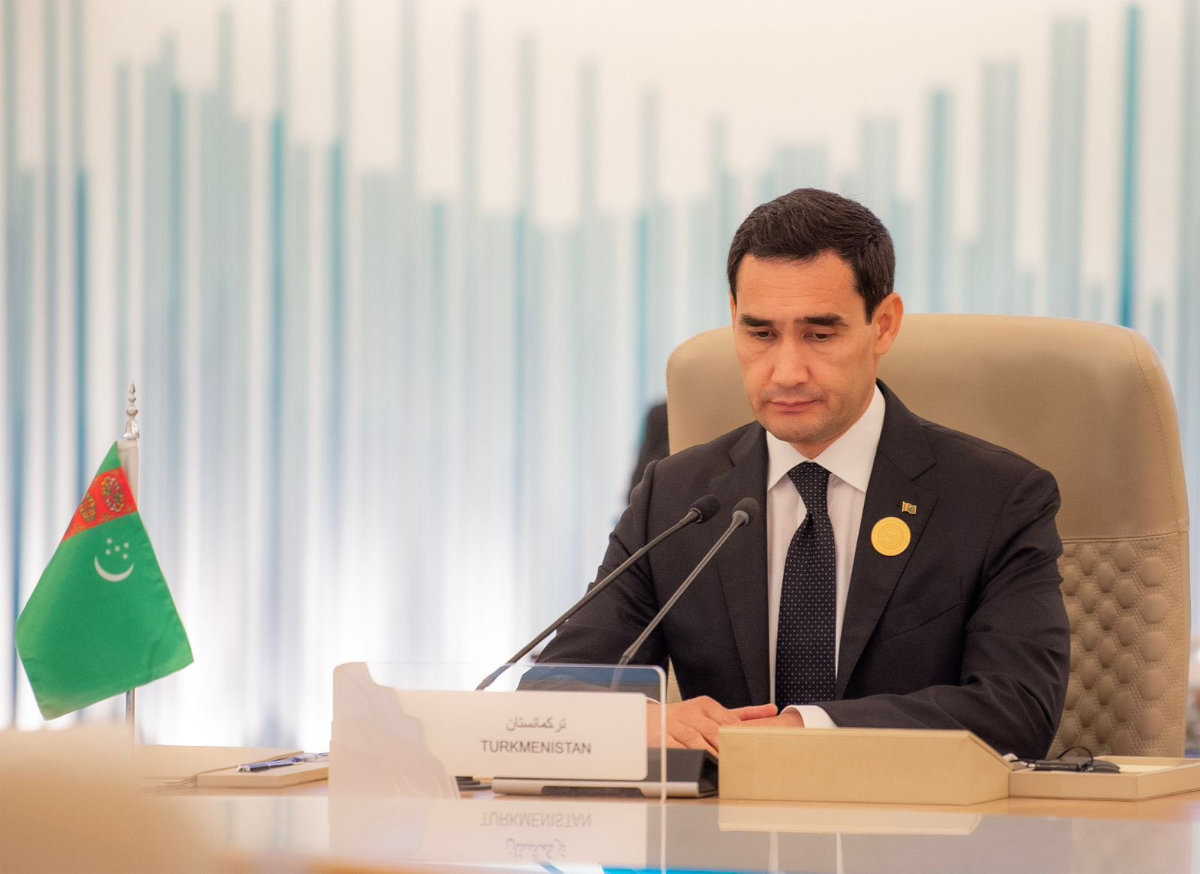
Turkmenistan President Serdar Berdimuhamedow. (SPA)
“We also seek to develop a sports partnership between Central Asia and Gulf countries.”
Based on their comments during the summit, there appeared to be a particular appetite among the leaders for joint infrastructure projects.
“Central Asia is a region with wide economic opportunities,” Kyrgyzstan’s Japarov said. “Economic and investment cooperation is the most important thing on the agenda of this summit. I invite our partners to cooperate in building railways linking Central Asia to the Gulf.”

Saudi Crown Prince Mohammed bin Salman meeting with Kyrgyz President Sadyr Japarov (left) in Jeddah on July 19, 2023. (Twitter:
@KSAmofaEN)
According to Saudi Investment Minister Al-Falih, the Kingdom and the Central Asian nations have enjoyed strong ties in part thanks to their religious bond, as the region has broadly professed Islam for the past 14 centuries.
He welcomed the strategic development plans laid out by the Central Asian countries, including Kyrgyzstan’s National Development Strategy 2018-2040 and Kazakhstan’s Strategy 2050.
He said such programs connect well with the visions of GCC member states, including Saudi Arabia’s Vision 2030 social reform and economic diversification blueprint, Oman’s Vision 2040, and Bahrain’s Economic Vision 2030.
In 2018, the GCC and Central Asia held their first economic forum in Kazakhstan, attended by representatives from the six GCC countries and C5, where the focus was to find ways to increase trade and investment between the two regions.
In 2020, a memorandum of understanding on cooperation in the field of education was signed that aims to promote student and faculty exchanges between the two regions. A year later, another MoU on cooperation in the field of tourism was signed to promote tourism between the two regions.
The value of exchanged goods between the GCC and Central Asian countries amounted to $3.1 billion in 2021, about 0.27 percent of the total value of the GCC merchandise trade. The value of GCC exports to Central Asia amounted to $2.06 billion in 2021, while imports amounted to $1.03 billion.
Air connectivity between the regions has increased in recent years, with Saudi airlines such as flynas linking the Kingdom with some Central Asian countries. Al-Rajhi International Group also has investment plans in the agricultural sector of Uzbekistan.
In recent years, cooperation on security has intensified, as both regions have faced growing threats from terrorism, extremism and other transnational challenges.

Saudi Foreign Minister Prince Faisal bin Farhan presides during a GCC foreign ministers meeting ahead of the GCC-C5 Summit. (SPA file photo)
In 2022, the GCC and Central Asian countries made a number of commitments to deepen their security cooperation. These included the establishment of a joint security dialogue to combat terrorism, extremism and other transnational threats.
It also involved the creation of a joint task force to coordinate their counterterrorism efforts, the exchange of intelligence and information on terrorist threats and training of security forces in counterterrorism and other security-related matters.
In 2022, the GCC and C5 also launched a strategic dialogue, which offered a more ambitious framework for cooperation. It covers a wide range of areas, including political and security cooperation, economic and investment cooperation, and cultural engagement. The goal is to create a stronger and more diversified partnership between the two regions.
